|
Getting your Trinity Audio player ready...
|
The United States Department of Justice (DOJ) is stepping up its focus on artificial intelligence (AI), with a top official warning on March 5 that companies and individuals who misuse the technology for white-collar crime, such as price fixing, fraud, or market manipulation, will be at increased risk of a harsher sentence.
“The ultimate disruptive technology—artificial intelligence—looms larger than ever,” said Deputy Attorney General Lisa Monaco.
“All new technologies are a double-edged sword—but AI may be the sharpest blade yet. It holds great promise to improve our lives — but great peril when criminals use it to supercharge their illegal activities, including corporate crime.”
The comments came as Monaco delivered the Keynote remarks at the American Bar Association’s 39th National Institute on White-Collar Crime.
She also took the opportunity to state that the Justice Department will be upping its game regarding monitoring the area.
“While we work to responsibly harness the benefits of AI, we are alert to its risks, and we will be using our tools in new ways to address them,” said Monaco. “To be clear: fraud using AI is still fraud; price fixing using AI is still price fixing; and manipulating markets using AI is still market manipulation. You get the picture.”
Tougher sentences for those who abuse technology for financial advantage and crime were another key takeaway from the Deputy Attorney General’s speech.
“We have long used sentencing enhancements to seek increased penalties for criminals whose conduct presents especially serious risks to their victims and to the public at large—like increased penalties for criminals that use firearms or other dangerous weapons,” said Monaco.
“The same principle applies to AI. Where AI is deliberately misused to make a white-collar crime significantly more serious, our prosecutors will be seeking stiffer sentences—for individual and corporate defendants alike.”
The comparison between the use of dangerous weapons in violent crime and AI use in white-collar crime underlines the seriousness with which the Justice Department is taking the rapidly developing technology.
Perhaps uncoincidentally, the comments came one day after the Justice Department
announced charges against Linwei Ding, a.k.a. Leon Ding, a former Google (NASDAQ: GOOGL) software engineer accused of stealing trade secrets about AI while secretly working for two Chinese companies.
During her speech last Tuesday in San Francisco, Monaco also took the opportunity to warn compliance officers to take note:
“I have directed the Criminal Division to incorporate assessment of disruptive technology risks—including risks associated with AI—into its guidance on Evaluation of Corporate Compliance Programs,” Monaco said.
“When our prosecutors assess a company’s compliance program — as they do in all corporate resolutions — they consider how well the program mitigates the company’s most significant risks. And for a growing number of businesses, that now includes the risk of misusing AI.”
She added that going forward, prosecutors would assess a company’s ability to manage AI-related risks as part of its overall compliance efforts.
AI has been on the Justice Department’s agenda for a while. Monaco recently announced a new initiative called “Justice AI” when speaking at the University of Oxford in February. It involves a series of convenings with stakeholders across industry, academia, law enforcement, and civil society “to address the impacts of AI.”
The first discussion session of the ‘Justice AI’ initiative was convened in the Bay Area the same day Monaco gave her keynote to the American Bar Association.
“We will use these conversations to inform the Department’s AI policy on a range of fronts, including the corporate compliance issues I’ve asked the Criminal Division to consider,” said Monaco.
In order for artificial intelligence (AI) to work right within the law and thrive in the face of growing challenges, it needs to integrate an enterprise blockchain system that ensures data input quality and ownership—allowing it to keep data safe while also guaranteeing the immutability of data. Check out CoinGeek’s coverage on this emerging tech to learn more why Enterprise blockchain will be the backbone of AI.
Watch: AI Forge masterclass—Why AI & blockchain are powerhouses of technology

 07-08-2025
07-08-2025 





